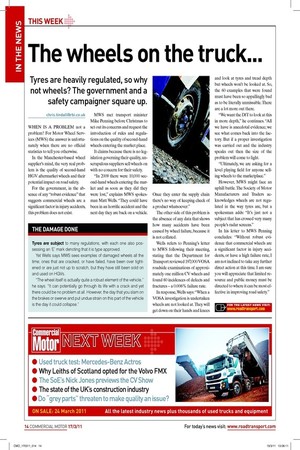The wheels on the truck...
Page 11

If you've noticed an error in this article please click here to report it so we can fix it.
Tyres are heavily regulated, so why not wheels? The government and a safety campaigner square up.
chris.tindall@rbi.co.uk WHEN IS A PROBLEM not a problem? For Motor Wheel Services (MWS) the answer is unfortunately when there are no official statistics to tell you otherwise.
In the Manchester-based wheel supplier’s mind, the very real problem is the quality of second-hand HGV aftermarket wheels and their potential impact on road safety.
For the government, in the absence of any “robust evidence” that suggests commercial wheels are a significant factor in injury accidents, this problem does not exist. MWS met transport minister Mike Penning before Christmas to set out its concerns and request the introduction of rules and regulations on the quality of second-hand wheels entering the market place.
It claims because there is no legislation governing their quality, unscrupulous suppliers sell wheels on with no concern for their safety.
“In 2009 there were 10,000 second-hand wheels entering the market and as soon as they did they were lost,” explains MWS spokesman Matt Wells. “They could have been in an horrific accident and the next day they are back on a vehicle. Once they enter the supply chain there’s no way of keeping check of a product whatsoever.” The other side of this problem is the absence of any data that shows how many accidents have been caused by wheel failure, because it is not collated.
Wells refers to Penning’s letter to MWS following their meeting, stating that the Department for Transport reviewed 197,000 VOSA roadside examinations of approximately one million CV wheels and found 60 incidences of defects and fractures – a 0.006% failure rate.
In response, Wells says: “When a VOSA investigation is undertaken wheels are not looked at. They will get down on their hands and knees and look at tyres and tread depth but wheels won’t be looked at. So, the 60 examples that were found must have been so appallingly bad as to be literally unmissable. There are a lot more out there.
“We want the DfT to look at this in more depth,” he continues. “All we have is anecdotal evidence; we see what comes back into the factory. But if a proper investigation was carried out and the industry speaks out then the size of the problem will come to light.
“Ultimately, we are asking for a level playing field for anyone selling wheels to the marketplace.” However, MWS might face an uphill battle. The Society of Motor Manufacturers and Traders acknowledges wheels are not regulated in the way tyres are, but a spokesman adds: “It’s just not a subject that has crossed very many people’s radar screens.” In his letter to MWS Penning concludes: “Without robust evidence that commercial wheels are a significant factor in injury accidents, or have a high failure rate, I am not inclined to take any further direct action at this time. I am sure you will appreciate that limited resource and public money must be directed to where it can be most effective in improving road safety.”


















































